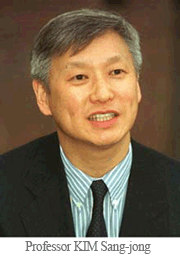 By Kim Sang-jong, Professor, Dept. of Biological Sciences
By Kim Sang-jong, Professor, Dept. of Biological SciencesLately, overreach has been a dominant theme in South Korean society. When an administration overplays its hand, there’s typically a sense of desire and anxiety behind it. At the core is a desire to maintain power, and anxiety accompanying it is proportional to the amount of that desire. The foolish moves emerging from this context have been dominating our society lately. This topic came up at a dinner attended by professors from various areas of research.
Such moves always give rise to controversy, and so subordinates are needed. But subordinates tend to go overboard, intoxicated by the small amount of authority given them. Such an abuse of power can come back to make life difficult for them over and over afterwards. In the end, they might lose not only the trust of the academic world and society, but even that of their own family members, since it is always easy to access people’s judgments on public activity.
We have seen a lot of these blunders. Too many. Prosecutors have been delving once again into the “PD Notebook” incident. (One chief prosecutor for the case is known to have submitted a resignation due to pressure from above over differences of opinion.) The arrest and prosecution of “Minerva” achieved partial success in gagging South Korean Internet users. Supreme Court Justice Shin Young-chul is seen by many as having brought down the prestige of the judiciary with his intervention in the trials of candlelight vigil demonstration participants. The police, taking six lives in the course of an unprecedented suppression of protestors, and working with all their might to protect a certain newspaper company head during the investigation of a young actress’s suicide. Grand National Party lawmakers, including National Assembly Chairman of Foreign Affairs, Trade and Unification Committee Park Jin, committing their own blunders related to the passage of the South Korea-United States free trade agreement.
If we look through these cases, we see the National Assembly, judiciary and government all participating actively in these reckless moves. The press is no exception either. Conservative newspapers are taking it upon themselves to serve as trumpeters for these overreaches for the sake of their own benefit and survival. The scope of the overreach is very broad, indeed extending even to social and religious groups.
Not to be left out of the list of recent overreaches is the “Four Major Rivers Restoration Project.” This project decided upon by the Presidential Committee on Balanced National Development was advertised as having the possibility of creating 190,000 new jobs and generating a production inducement effect of 23 trillion won through a 14 trillion won effort. However, the project has gone ahead without any specific plan for it, and the master plan still has not come out. It looks like its drafters have a lot to think about. Even though it is considered an area of interest for a President who once managed a construction company, they know very well that many of the items filling the master plan are not appropriate and that it will be difficult to convince the people logically of their benefits. They say that the water issue will be fundamentally resolved, but the restoration of the four rivers is essentially already about 97 percent complete. Expert opinion on this is that the effect of water quality improvement will be very slight. A mock experiment carried out by the National Institute of Environmental Research found that water quality in rivers could actually be worsened by the installation of dams and submerged weirs for the restoration project. Further, even if we include short-term, temporary job positions, only around one fifth of the jobs the government claims would be generated, and many are also presenting the criticism that employment effects are being used as an excuse to support the activity with construction businesses. We are also seeing the beginnings of a controversy over the utility of the investment in bicycle paths and leisure facilities they said they would be building in sparsely populated regions.
The master plan should be coming out in May. There is likely to be a heated debate over the pros and cons of this plan. The Presidential Committee on Balanced National Development and the Presidential Committee on Green Growth will be taking on the role of research think tanks for the government’s side, and it is expected that we will see the emergence of various subordinates. An interesting fact is that the directors of the two presidential committees, Choi Sang-chul and Kim Hyung-kook respectively, and two prominent individuals coming out against the project, professor emeritus Rhee Jeong-jeon and Professor Kim Jung-wk, are all affiliated with Seoul National University’s Graduate School of Environmental Studies. Professor Rhee has already issued a public criticism of Kim Hyung-kook’s statements.
Experts may disagree on certain items, but it is hoped that no further subordinates have to suffer misfortune as they play a lead role for an administration overplaying its hand to prolong its grip on power.

